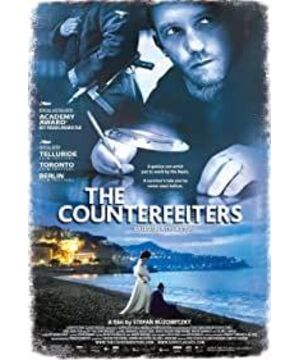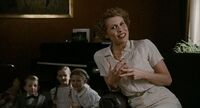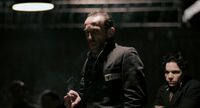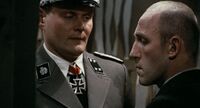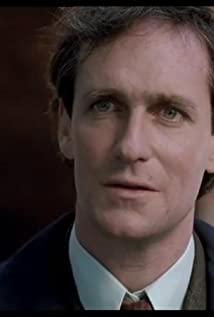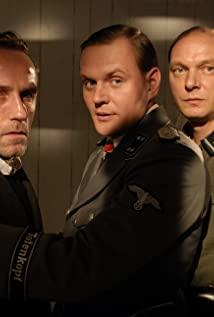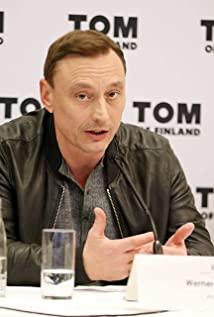"Operation Bernard" is also about war, but it has nothing to do with war. The background of the story is World War II, and the characters of the story are a group of people who were in a German concentration camp during World War II. This group of people is very talented, especially in painting and printing. Such a group of people, gathered by the Nazis, did something to "help the tyrants" -- making counterfeit banknotes.
In front of this group of people, there are two paths: either make counterfeit banknotes and live the life of a "high-class person" in a concentration camp, or go to a concentration camp and be tortured to death. In other words, either live humbly or die less heroically.
Bei Dao Poem: The mean is the pass of the mean, and the noble is the epitaph of the noble. In this movie, it can be changed to this: the humble is the pass of the humble, and the blood is the epitaph of the warm-blooded.
But after all, everyone is a humble person who needs to live, and all they can do is wait.
To live is the instinct of human nature.
When we are used to seeing a righteous and awe-inspiring death, should we also face up to a humble life?
This humbleness is not cowardice, despicable, nor shameless. This kind of humbleness is the humbleness of power, the humbleness of life, and the humbleness of dignity.
God created our proud spirit, but gave us humble and fragile life.
Solomon Slovich was first a talented painter, second a document forger, and again, a Jew. His ingenious technology can forge all kinds of documents and draw all kinds of pictures, which are enough to make fakes look real. After being taken into the concentration camp, he used his own cleverness (called "flattery" in an unpleasant term, but it was indeed a survival instinct in that environment) to let the Nazi officers know of his abilities, and won the prize of not working. Opportunity to paint. Later, it was sent to the counterfeit banknote production base code-named "Operation Bernard".
The people in this counterfeit banknote manufacturing base are basically Jewish "prisoners" captured by the Nazis. Smart and professional, he just formed a small printing factory. Their goal is to create counterfeit money - pounds and dollars. Perhaps this is how the story should go. This group of people resisted stubbornly and finally sacrificed heroically, or this group of people made an "inside line" and cooperated with the Allied forces to defeat the Nazis, or they escaped through their own efforts... There are many possibilities, each Anything can be a complete story, a complete movie. But the screenwriter (director) chose another path - to live.
live humbly.
Live tenaciously.
Is Solomon Slovic a good guy or a bad guy? It is estimated that there will be many different views. Some say he was a bad guy because he flattered the Nazis, made counterfeit money for the Nazis, and even prevented progressive youth from rebelling against the Nazis. Some people also say that he is a good person because he can cut a knife in both sides for the sake of his friends. He cares and loves all the friends around him, and even went to exchange with the Nazis for a child with tuberculosis...
People who are full of doctrines and theories are good people. . But how could Solomon, whose life is the most precious, not be a good man? When material conditions are extremely poor and life cannot be guaranteed, should one put morality and doctrine aside and choose to save one's own life first?
No one is wrong, just because life is too fragile.
Only when there is life can we discuss art discussionism.
The most profound thing is that the two of them were eating sour food and discussing the art of painting in the cramped carriage.
There was music playing all the time outside the camp. Some people said: There is music here, there are white and soft beds, and you can take a bath here!
There is an idealist in the film who exists as the opposite of Solomon. But not the opposite of evil. Idealists are radical and thoughtful, but at that time, when the tiger fell, the hero was useless, and once the force was used, it would be a needless sacrifice.
Solomon can be said to be a man without "thoughts". He only cares about his art, his own happiness, his own life. In his view, without life, nothing can be accomplished. What's the use of hands full of blisters and blood scabs without art? Unlike Cheng Dieyi who said "they understand drama", Solomon still needs life, while Cheng Dieyi is a lifeless person. Unlike Mei Lanfang, Mei Lanfang can resist silently, grow a beard, and get hoarse with injections, but Solomon concentrates on making his counterfeit banknotes. There is no distinction between them, there is no distinction between superior and inferior, and there is no distinction between good and evil. We can also like idealists, and we can also sympathize with Solomon, but it’s just two different ways of reaching the same goal in the same environment.
Pei Duofei's poem: Life is precious, and love is more expensive. For freedom's sake, both can be thrown away. This is the slogan of idealists.
Romain Rolland said: There is only one kind of heroism in the world, that is, those who understand life and love life. Was Solomon not a "hero"?
by--cabbage
View more about The Counterfeiters reviews


